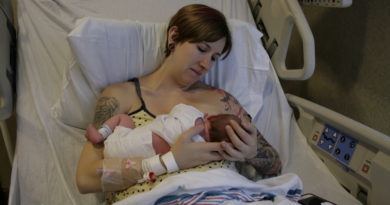Postpartum Depression Nearly Took My Marriage And My Life
By Kimberly Zapata
Most of the memories from my daughter’s first year of life are fuzzy — at best — and the memories I do have do not feel like my own, in that, I feel as though I am watching a movie, but I cannot follow the plot. I cannot connect with the characters, and all of the good parts are missing.
They are blurred-out, blacked-out, or skipped-over. But those are the lasting effects of postpartum depression.
Of my 16-month struggle with postpartum depression.
That said, there were a few “standout” moments: I remember the first time my daughter cooed. I remember the first time my daughter laughed. I remember the first time my daughter smiled. (God, how I miss that wide, toothless smile.) And I remember the first time I cried.
The first of many times we cried together.
Ironically, I didn’t cry when one might expect, which is to say I didn’t cry during labor. I didn’t cry during delivery, and I didn’t cry when she was born.
I didn’t cry — at all — when she was born.
But the tears began shortly after, in the hours, days, and weeks that followed.
Looking back, I know the tears weren’t caused by anything. At least they weren’t caused by any one thing. I recall crying the day after my daughter was born because I couldn’t silence her. Because I couldn’t soothe her. Because I couldn’t calm her down. I remember crying the following day because of the pain in my back, the pain in my breasts, and the searing pain in my crotch. But I also remember crying over laundry. I remember crying over the kitchen sink, and into my cold coffee. And I remember crying in the bedroom and bathroom and through the aisles of Walgreens — which I wandered often in a blurry-eyed, teary-eyed, sleep-deprived haze.
Hell, I remember crying because I couldn’t stop myself from crying.
But my greatest (or worst) memory isn’t actually a memory at all: It is a feeling I had, a thought I had, and a hypothetical moment I imagined and celebrated: It is the moment I decided I was going to leave her. When I decided I wanted to abandon my daughter, my husband, and my entire family.
You see, four months after my daughter’s birth I was so sick, I couldn’t speak. I was so sick, I couldn’t think, and I was so desperate to “feel better” that death felt like a tangible option.
Suicide seemed like a solid way out.
But so did divorce.
I could run into traffic, I thought, or just away. I could just run away.
And I almost did.
One fall day — with tears in my eyes and a lump in my throat — I kissed my daughter and husband goodbye for “the last time.”
I had no plans of coming back.
The good news is that I did, and shortly afterward, I told my husband something was wrong. I admitted to him how sad I was, how angry I was, and how much I wanted to leave. I told him I genuinely wanted to die, and he immediately helped me get help.
He supported me in any and every way he knew how.
But for months I still wanted to leave. Not this world, but my marriage. I wanted to leave him.
Why? Well, if I’m being honest, I don’t know. Three years later, I still don’t know. What I do know is that I resented his “unchanged life.” (I resented that fact that he still went to work, went to parties, and well, went out at all; he also showered every day and slept every night.) I resented his laugh and his smile.
Why the hell was he so happy? How could he be so happy?
And I was outraged by the bond he had with our daughter. I was jealous of the love he felt toward our daughter.
Before long, we were bickering. We were arguing, and we were fighting. Fighting so much that I pulled away.
We both shut up and pulled away.
Make no mistake: I loved them. Both. Completely and wholly and with every ounce of my being. But as the months went on, and my postpartum depression became worse, the love faded. My capacity to love faded, and I was swallowed by desperation, darkness, anger, and anxiety.
Unfortunately, I didn’t know how to say that. I didn’t know how to explain that, and my husband didn’t know how to help. So we stopped chatting. We stopped talking, and any conversations we did hold were idle.
We spoke about superficial shit like Star Wars and the weather but not my mental health.
We never spoke about the disintegrating state of our marriage.
But that is because we were scared. We were both too damn scared.
The good news is that, with individual counseling and couple’s counseling, we made it. Three years later, I can happily report we came through, but the truth is many couples do not, especially since — according to Postpartum Progress — the first year after having a baby is “the most difficult for marriages and partnerships.” Of course, this comes as no surprise, as having a baby will understandably cause “major shifts in relationships that require a significant amount of work, understanding, and reinventing. However, when you add a postpartum or perinatal mood disorder to the mix, relationships become more difficult and more complicated.
Hell, everything becomes more complex and complicated.
So how do you protect your marriage? How do you make it work? Well, the truth is I don’t know. I genuinely do not know. But whatever happens, try to remember the good days. The happy days. The days of your love past. And treasure those memories — hold them close — while you hang on. Reach out for support, and just hang on.




